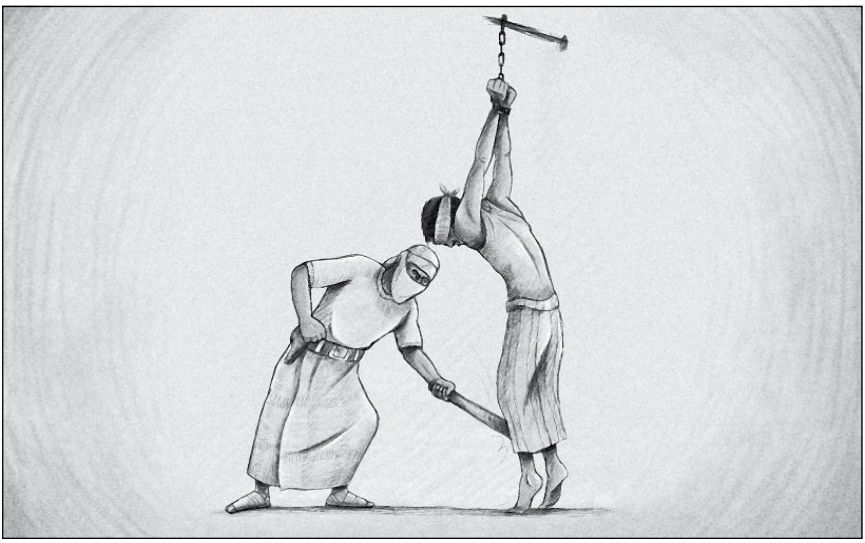They only allowed me to call my family three times, and the first time was after a whole year of my detention.
“Al-Thawrah” newspaper quoted Riyash, who was kidnapped and held captive by the mercenaries, as saying: “They abducted me from Al-Falaj checkpoint in Marib while I was traveling to Shabwa to find work, and I stayed in their prisons for six years without any guilt.”

I traveled between three prisons and witnessed types of torture that are beyond belief."Some of the detainees died in front of my eyes due to negligence and the lack of available treatments to combat the widespread diseases."The aggressor who targets civilians and innocent people, and extends his tyranny to them, kidnaps them, and forcibly hides them in his prisons without any crime they have committed is a coward. All religious and tribal traditions, as well as international treaties, restrict harming them, and those who do so are punished. According to the Human Rights and Freedoms Organization, which held a press conference to document the crimes and violations committed by the aggression and its mercenaries against civilian detainees since its establishment in November 2021 until May 2023, in several prisons in Marib, Hadramout, Aden, Al-Mahrah, Socotra, and Al-Mukalla, a total of six prisons in Marib and eight in Al-Mukalla and southern provinces, there are approximately 1200 abductees being held in the prisons of the aggression and its mercenaries, including expatriates, travelers, students, academics, women, and children, who were kidnapped and forcedly hidden before being tortured in various ways, most of which result in death.During its coverage of the conference, "Al-Thawrah" met one of the abductees, brother Tawfiq Riyash, who spent more than six years of his life in the prisons of the mercenaries without any crime or charge. He narrated to "Al-Thawrah" his entire story, detailing the circumstances surrounding his arrest, the torture techniques used on prisoners, the rampant illnesses present in such facilities, and the great indifference shown by those in charge of those facilities. He also thanked the political and revolutionary leadership for their concern for the detainees and their efforts to free them from the darkness of the prisons of the oppressors. He also praised the efforts of the Human Rights Organization and its role in highlighting the issues of detainees and documenting the violations and crimes committed against them. He called on international organizations to assume responsibility and play their role in releasing all civilian detainees.
Al-Thawrah / Ahmed Al-Saiedy.
To details:
The kidnapping Story:
At the beginning, the kidnapped Tawfiq Ahmed Ali Measar Riyash from Al-Mahwit Governorate, 28 years old, told us his kidnapping story, saying: “I was traveling to Shabwah Governorate to start working as a pharmacist technician after recently graduating from the University of Science and Technology. When I arrived at the Al-Falaj checkpoint in Marib Governorate, I was taken out of the taxi and kidnapped after they checked the passengers’ identification cards. Then they threw me into a prison that I couldn’t know. I couldn’t sleep that night in the solitary cell I was put in because I didn’t understand why I had been arrested. When they took my phone and prohibited me from at least calling my family, my perplexity turned to despair. Even though they initially treated me with a little respect, which covers the horrific violence and crime committed against innocent abductees who have committed no crime, I was still somewhat optimistic that there might have been a misunderstanding.
The fabricated Charges:
As for the charge that was leveled against Tawfiq Riyash, he added: “The next morning, I was interrogated and confronted with the funny and detailed charge that any citizen coming from the liberated governorates is a ‘Houthi’ who participates in the battle fronts. At that point, I denied it and swore to them with strong faith that I had never been involved in combat, and I had not even shouted the slogan before. Unfortunately, this is the truth. I told them that if I were a Houthi participating in the fighting fronts, what would motivate me to go to work in a governorate belonging to the aggression and bring my graduation certificates with me? Then the torrent of insults began with the words ‘you don’t look like you deserve respect, son of…’ and then the beating and torture started in various forms for a month until I was interrogated again and informed of a new charge, which is that I was among those who stormed and looted Sheikh Mohsen Thamer’s house belonging to them in Al-Mahwit Governorate, even though I was in Sana’a that day for studying and the Sheikh’s house was actually in the neighboring village, not in my village.
New Prison and Suffering:
The released abductee Riyash continues to speak with great anguish about his journey of suffering, moving between the prisons of aggression. He says, “After two months of torture and humiliation, I was transferred to a prison called the “Saleh Institute,” one of the prisons for detainees, where they considered me a prisoner from the battle fronts. Various more brutal forms of torture and harassment were practiced in that prison. We were only allowed to go to the bathroom once a day, and if anyone wanted to go a second time, they were coerced into urinating in plastic cans. When we went to the bathroom for the only time, we were beaten, as well as when we came back. As for the food, it was no more than three small pieces of “Kodam” bread per person. After a year of suffering and oppression, I was transferred to the “Political Security” prison, even though they never questioned me during that year. In Political Security, I was put in a small room that measures 2 meters in length and 1.8 meters in width with five other detainees, including “Amir Al-Deen Jhaf,” who is now in charge of the organization “Insan” that hosted us today. I was moved to several cells in that prison while weekly and sometimes daily torture campaigns continued.
Epidemics and Neglect:
We asked the abducted Tawfiq Riyash about his health situation in those prisons, and his response was painful, revealing the inhumanity of those who run these prisons. He said, “At the beginning, the detainees faced some health problems and wounds as a result of torture, and I, in turn, used my medical and pharmaceutical knowledge to help them, such as giving injections and suturing wounds. But they prevented me from doing so and told me that death in prison would be better for us. In the Saleh Institute, there is no medical care whatsoever, and the cholera epidemic spread among the detainees, some of whom died in front of me due to the unavailability of treatment. In the Political Security prison, some detainees contracted tuberculosis; this was one case. When I informed the prison doctor that this disease is serious and can lead to death, he ignored the matter and brought us an analgesic pill or needle after we demanded it for three days. Then tuberculosis spread, and some died, including someone named “Hashim Al-Dhahab” and another named “Sadeq Al-Jaseema.” As for the detainee “Mohammed Al-Malahi,” he got out between life and death, and we have had no news of him since.”
Suffering of the Abductees’ Families:
Regarding the suffering that the family of the abductee Tawfiq Riyash endured, he responded, “I spent six and a half years in prison, from 2017 to the 10th of Shawwal 2022. They only allowed me to contact my family three times, the first time after a year of my detention. During that year, my family suffered greatly in their search for me. They thought I was dead and started looking for my picture on the missing persons page in the newspapers and for my corpse in hospital refrigerators. My mother developed diabetes and high blood pressure due to her extreme sadness over my fate. After another year and eight months, they allowed me to contact to lure them into bringing an alternative for their son’s release. When my family asked about the alternative, they were told it was someone who was involved in the raid on Sheikh Mohsen’s house or one of the leaders in the Houthi, according to their claim. Then they called my father again without my knowledge and told him that he had to arbitrate Sheikh Mohsen Thamer and return what was stolen in exchange for my release. My father told them that we have nothing to do with what happened in Sheikh Mohsen’s house.
Worst Moments and Methods of Torture:
We asked Tawfiq about the worst moments he experienced in prison during all those years, as well as the methods of torture that the criminals used against the abductees and prisoners. He said, “All the years in prison were bitter, where six years of suffering and illness were spent between four walls without freedom, decent food, or medical care. But the worst moments were those in which we were subjected to brutal torture. When I was in the Saleh Institute prison, criminal torture campaigns were carried out, where we were asked to lie down, and then they stomped on us in the mouth, chest, or sensitive areas. “After September 30th, a new form of torture was implemented. A military unit comprising 30 soldiers entered while we were sleeping and climbed on top of us, with six soldiers standing on each prisoner’s body to break our bones. Other methods of torture included electric shocks, beatings with solar energy wires, hanging us with our hands tied behind our backs for a day or more, mutilation of our genitals, and drilling holes in our bodies with nails and sharp tools.
Fellow Detainees:
Tawfiq added that he met many civilian detainees in the prisons of the aggression, saying, the number of civilian detainees that I met in prisons was very much. Some were arrested while they were going to Saudi Arabia, while others were arrested while traveling from one province to another. The charges against them were numerous; some were accused of being former military personnel, while others were accused because of their nickname, such as “Hashemi.’ One of the long-term detainees I spent time with was Yasser Al-Mujahidi, who is from Marib and was arrested because of his visit to Sana’a. His father died while he was in prison, and his mother had a heart attack and now needs a valve replacement. Another detainee was Marwan Meayad, who was going to ‘Shehin Port’ to pick up his car when he was arrested. They asked him for an alternative that does not exist in Sana’a’s prisons, and there are many whom some organizations visited, but the criminals hid us until the organizations left.
Releasing Me:
The released detainee Tawfiq Riyash also recounts the moments of his release, saying, I was released because I was between life and death due to my illness. I had severe infections and coughing, to the point where I was vomiting blood, and I was not the only one suffering from the same problem. When I flatly refused to eat, they got in touch with the provincial delegate, who got in touch with my father, and requested a sizable sum of money in a desperate attempt to take advantage of me. They told him that they were not responsible for my death if the payment was delayed. After my father agreed, they took me out in a car with a companion from my city of Al-Mahwit. Before that, I was supposed to be released in a prisoner exchange deal, but they exchanged me with one of those involved in the suicide bombings.
Released detainee Tawfiq concludes his talk with an urgent appeal to world organizations and the United Nations to release the remaining civilian detainees who have no charges against them. He also thanked the revolutionary leadership represented by Al-Sayed Abdulmalik Badr al-Din al-Houthi and the political leadership represented by President Major General Mehdi Mohammed Al-Mashat for their concern for the abductees, as well as the media and the “Insan” organization for inviting them to make the world hear their voices and the pain they suffered in the prisons of the aggression.


